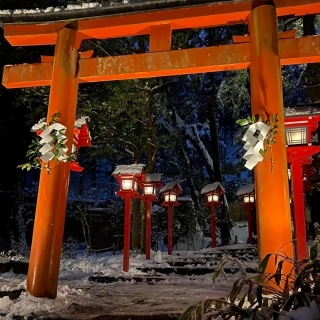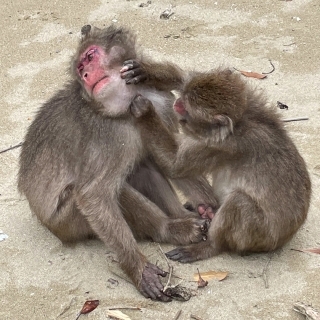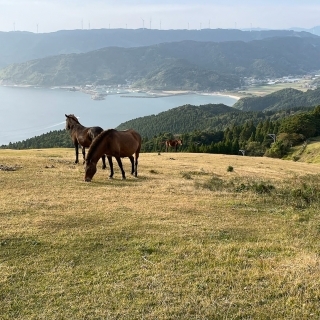Researching Chimpanzees in Japan through MEXT
2023/4/26
 The path to Kifune Jinja during wintertime.
The path to Kifune Jinja during wintertime.
By Christen Lin, MEXT Graduate/Research Student
My name is Christen Lin, and I am currently studying at Kyoto University’s Wildlife Research Center as a master’s student under the MEXT research student scholarship. My research is focused on examining the process of emotional transfer within various primate species.
Why Japan?
I had previously spent my third year as an undergraduate studying abroad in Tohoku University, and I greatly enjoyed my time in Japan. While looking for graduate school opportunities, I found that studying at Kyoto University would not only be an excellent opportunity to return to Japan, but also would provide a once-in-a-lifetime chance to work with many established researchers and primates affiliated with the University. Studying at Kyoto University has allowed me to work with chimpanzees, bonobos, and other species at various sites, including the Kyoto City Zoo, Kumamoto Sanctuary, EHUB (Center for the Evolutionary Origins of Human Behavior), and more.
Studying in Kyoto and other sites throughout Japan
Near the beginning of my program, I spent 6 months taking language classes at Kyoto University’s Yoshida campus. I found that for me, the area near the school was a perfect middle ground between too crowded and rural, and whenever us students longed for more of a city experience, we could take a quick 20-minute bus ride from campus downtown. Even as someone who is not very fluent in Japanese, I did not find it very difficult to adjust to and navigate Kyoto, especially with the city being such a famous tourist spot. There are many great sightseeing locations throughout the city too, with many even being within walking distance of the main campus. Some of my favorite hiking spots and temples include the Kamo River, Ginkakuji, and Kifune Shrine.
My name is Christen Lin, and I am currently studying at Kyoto University’s Wildlife Research Center as a master’s student under the MEXT research student scholarship. My research is focused on examining the process of emotional transfer within various primate species.
Why Japan?
I had previously spent my third year as an undergraduate studying abroad in Tohoku University, and I greatly enjoyed my time in Japan. While looking for graduate school opportunities, I found that studying at Kyoto University would not only be an excellent opportunity to return to Japan, but also would provide a once-in-a-lifetime chance to work with many established researchers and primates affiliated with the University. Studying at Kyoto University has allowed me to work with chimpanzees, bonobos, and other species at various sites, including the Kyoto City Zoo, Kumamoto Sanctuary, EHUB (Center for the Evolutionary Origins of Human Behavior), and more.
Studying in Kyoto and other sites throughout Japan
Near the beginning of my program, I spent 6 months taking language classes at Kyoto University’s Yoshida campus. I found that for me, the area near the school was a perfect middle ground between too crowded and rural, and whenever us students longed for more of a city experience, we could take a quick 20-minute bus ride from campus downtown. Even as someone who is not very fluent in Japanese, I did not find it very difficult to adjust to and navigate Kyoto, especially with the city being such a famous tourist spot. There are many great sightseeing locations throughout the city too, with many even being within walking distance of the main campus. Some of my favorite hiking spots and temples include the Kamo River, Ginkakuji, and Kifune Shrine.
 A Japanese macaque receives grooming (Koshima Island)
A Japanese macaque receives grooming (Koshima Island)
 The view atop Cape Toi. Included in the picture are several feral (wild) horses.
The view atop Cape Toi. Included in the picture are several feral (wild) horses.
Most of my time, however, has been spent at various research sites throughout Japan. Locations I have had the chance to visit through field and research courses include Cape Toi, Koshima Island, Ashiu Forest, and more. Every site was wonderful, and it was amazing to see the animals located at each one.
 The ocean view from Kumamoto Sanctuary.
The ocean view from Kumamoto Sanctuary.
The view from Kumamoto Sanctuary, one of my main research sites, is also amazing. There, we can work with several chimpanzee and bonobo individuals, who were relocated to the sanctuary after being rescued from biomedical research. I am also conducting research with other students at Kyoto University’s EHUB (Center for Evolutionary Origins of Human Behavior), where I have had the amazing opportunity to work with several chimpanzees who are famous for their touchscreen abilities (such as Ai and Akira, who were previously featured on Vsauce!).
Getting the chance to work with chimpanzees up close has raised my interest in a position related to animal welfare as a future career. I have come to realize that there is much more than just providing daily meals that goes into the welfare of animals, especially for a species as intelligent and profound as chimpanzees. Caretakers must maintain positive relationships with the chimpanzees, and also take into account the relationships between chimpanzees when making decisions. They must also provide opportunities for mental enrichment, and interact frequently with the chimpanzees, to make their stay at the sanctuary a more positive experience. Experiencing this firsthand has made me realize how much I enjoy caring for animals.
Advice to prospective scholars For any incoming MEXT scholars, I would highly recommend Kyoto University. It is a wonderful city to live in, and there is always somewhere to go or something to do during your free time. For people more accustomed to less extreme weather (like me), I would recommend packing many more extra layers of clothing for the winter. The other main piece of advice I would like to give is to remain flexible with your choice of research topic/question, regardless of what your field is. The lab culture in Japan is a bit different from the U.S. and depending on your supervisor, you may end up having a very different research project from your initial plan. I recommend keeping an open mind and making sure you take any opportunities you can to meet new researchers and people, and also to visit new places, whether for research conferences, field work, or anything else. Good luck and have fun in Japan!
Advice to prospective scholars For any incoming MEXT scholars, I would highly recommend Kyoto University. It is a wonderful city to live in, and there is always somewhere to go or something to do during your free time. For people more accustomed to less extreme weather (like me), I would recommend packing many more extra layers of clothing for the winter. The other main piece of advice I would like to give is to remain flexible with your choice of research topic/question, regardless of what your field is. The lab culture in Japan is a bit different from the U.S. and depending on your supervisor, you may end up having a very different research project from your initial plan. I recommend keeping an open mind and making sure you take any opportunities you can to meet new researchers and people, and also to visit new places, whether for research conferences, field work, or anything else. Good luck and have fun in Japan!
